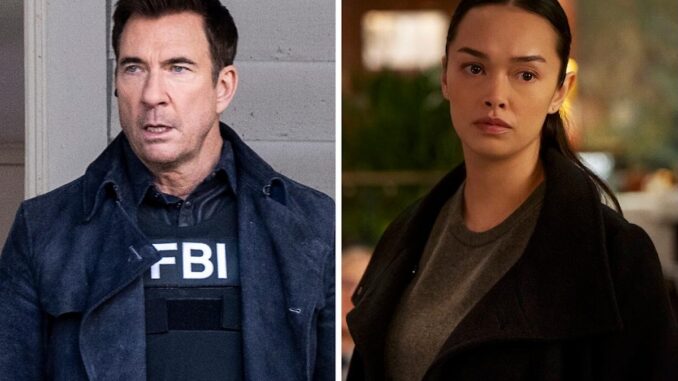
CBS Cancels ‘FBI: International’ and ‘FBI: Most Wanted’ – The Real Story Behind the Network Shake-Up
In a surprising move that shocked fans across the country, CBS has pulled the plug on two of its prominent FBI franchise shows: FBI: International and FBI: Most Wanted. The decision came abruptly, raising eyebrows and sparking countless rumors online. But CBS president and CEO George Cheeks laid it out plainly: “They weren’t working out from an economic perspective.”
So what does that really mean? Let’s break it down.
The Business of Television: Why Ratings Aren’t Everything
Sure, ratings matter—but in 2025, it’s not the whole picture.
While both shows maintained solid Nielsen numbers and drew a loyal viewer base, Cheeks revealed that the production costs and profit margins simply didn’t add up anymore. In a time where ad dollars are shifting and streaming services dominate, even a decent show must earn its keep.
The Economic Equation: Cost vs. Revenue
Let’s talk dollars and sense.
Each episode of FBI: International reportedly cost around $4 million to produce. With much of the series filmed abroad, travel and foreign production expenses added up fast. Meanwhile, ad revenue didn’t spike high enough to justify those costs.
Similarly, FBI: Most Wanted, while domestically shot, relied on a larger cast and high-octane action sequences—translation: expensive logistics.
The Trouble With Filming Overseas
International settings = stunning visuals, but also staggering costs.
FBI: International was unique for filming in cities like Prague, Budapest, and Rome. That global appeal added authenticity and flair, but coordinating an international crew, paying for location fees, and flying talent around the globe proved unsustainable.
It’s the entertainment equivalent of eating caviar on a fast-food budget.
Creative Fatigue: Was It Time to End the Spin-Offs?
From a storytelling angle, things were starting to look familiar.
Even loyal viewers noticed plotlines repeating or lacking the punch of earlier seasons. Procedural fatigue may have set in—audiences weren’t sticking around as long, and social media buzz was on the decline.
CBS likely looked at that creative dip and asked: Is the juice worth the squeeze?
CBS’s Strategic Pivot: Quality Over Quantity
Cheeks emphasized that CBS is not moving away from procedurals entirely. Instead, the focus is shifting toward quality storytelling that delivers better ROI.
Think fewer shows, higher impact.
In short: trim the fat, invest in the muscle.

Streaming Wars and Changing Viewing Habits
Let’s not forget the elephant in the room: streaming.
Linear TV viewership is dropping like a rock. Gen Z and millennials aren’t tuning in live—they’re binging, skipping ads, and watching on demand. That creates a revenue gap for traditional networks, especially when shows don’t have a strong digital footprint.
Neither FBI spin-off had the cultural buzz or viral moments to survive in this new media climate.
Audience Metrics Didn’t Tell the Whole Story
It’s not just about who watches—it’s about how they watch and what they buy.
Advertisers care more about engagement, demographics, and purchase behavior than raw viewer numbers. While Most Wanted and International had a consistent fan base, they didn’t attract the 18–49 demographic advertisers covet.
Franchise Fatigue: When Spinoffs Start to Cannibalize
The FBI universe is part of Dick Wolf’s empire, including Law & Order and Chicago franchises. But there’s a limit to how many procedurals viewers can digest.
By stretching the brand too thin, CBS may have diluted what made the original FBI special. It became harder to distinguish one show from the next—three FBI shows airing back-to-back felt like too much of the same flavor.
Ratings Were Declining, Quietly But Surely
Though not catastrophic, both shows saw a ratings dip over the past year.
When budget cuts loom and advertisers grow selective, networks scrutinize every tenth of a ratings point. With costs high and engagement shrinking, something had to give.
What George Cheeks Really Meant
Cheeks’ statement was blunt, but honest: “From an economic perspective, these shows weren’t working.”
Translated: They were too expensive, not viral enough, and didn’t bring in the right advertising money. It’s not personal—it’s business.
What’s Next for the FBI Franchise?
The original FBI remains safe—for now.
CBS plans to double down on its flagship procedural while retooling its overall lineup to include newer dramas and limited series. There’s also talk of developing more contained, event-style thrillers that are easier to promote and binge.
Lessons Learned: Network TV in a Post-Cable World
Networks like CBS are learning to adapt—or perish.
Gone are the days of stuffing prime time with endless procedural clones. Audiences crave diversity, unique formats, and streaming-ready content. CBS is simply reading the writing on the wall and pivoting before it’s too late.
A Bittersweet Goodbye for Fans
While cancellations sting, they’re also a chance to appreciate what we had.
FBI: International gave viewers a global taste of justice. FBI: Most Wanted offered heart-pounding manhunts. Both carved a space in the crowded TV landscape and brought us compelling stories.
And like any good episode, sometimes it’s best to go out before the plot gets stale.
Conclusion: Business, Not Personal
CBS’s cancellation of FBI: International and FBI: Most Wanted wasn’t about ratings or fan loyalty—it was about business. In the cutthroat world of network television, every show is a balancing act between creative vision and financial return.
At the end of the day, if the numbers don’t make sense, even the best-loved shows face the axe.
❓ FAQs
1. Will FBI: International and FBI: Most Wanted return in any format?
As of now, there are no plans to revive the shows. However, characters could appear in crossover episodes with the original FBI series.
2. Is the original FBI show also at risk of cancellation?
No, the flagship FBI remains one of CBS’s top-performing shows and is safe for now.
3. Were low ratings the primary reason for the cancellations?
Not entirely. While ratings dipped, the high production costs and low return on investment were the main factors.
4. Will CBS develop any new shows to replace these spin-offs?
Yes. CBS is working on new procedurals and limited series that are more cost-effective and better suited for today’s viewing habits.
5. What does this mean for other Dick Wolf shows on CBS or NBC?
It’s a signal that even successful producers like Dick Wolf must adapt to changing economics. Other shows will likely face more scrutiny moving forward.